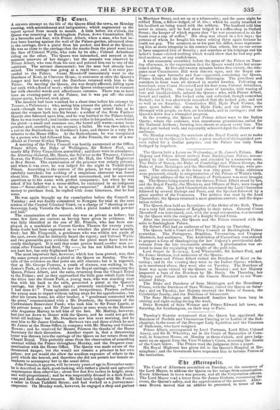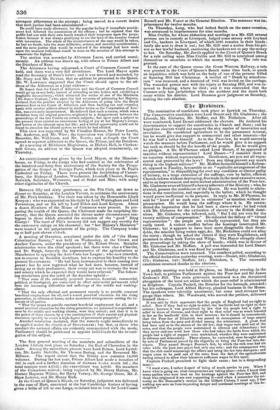Zbe .metropolis.
The Court of Aldermen assembled on Tuesday, on the summons of the Lord Mayor, to address the Queen on her escape from assassination. Every Alderman in town was present, and all the Corporation-officers. The Lord Mayor read a letter from Sir James Graham, announcing the event, the Queen's safety, and the apprehension of the assassin. Alder- man Brown moved that an address be presented, in terms of the
strongest abhorrence at the attempt ; being moved to a covert desire that mob justice had been administered— Ile could have made allowance for the popular feeling if immediate punish- ment bad followed the commission of the offence ; but he rejoiced that the public had not with their own hands wreaked their vengeance upon the perpe- trator, because it was always gratifying to see the laws of the country treated with veneration. The whole of the circumstances of the case would be taken, he had no doubt, into the most deliberate, serious, and merciful consideration ; and the same justice that would be rendered if the attempt had been made upon the meanest individual would be dune on the occasion of this attempt to assassinate the highest.
The motion was seconded by Alderman Lucas, and carried unani- mously. An address was drawn up, with others to Prince Albert and the Dutchess of Kent.
The Aldermen having adjourned, a Court of Common Council was held, and there was a very full attendance. The Lord Mayor again read the Secretary of State's letter ; and it was moved and seconded, by Mr. Stacy and Mr. Stevens, that an address be presented to the Queen. Mr. W. Lawrence suggested that the Court should agree to the ad- dress of the Aldermen as a joint address— He hoped that the Court of Aldermen and the Court of Common Council would go up as one body, instead of attending as two bodies, and exhibiting a laughable inconsistency, which attracted the notice of one of the Minister; [Sir James Graham,] who, upon the last occasion of addressing her Majesty, declared that the practice adopted by the Aldermen, of going into the Royal presence first as the Court of Aldermen and then backing out and returning again with another address almost in similar terms as the Corporation of Lon- -don, was extremely inconvenient. He believed that such a course, which was a deviation from the original practice, originated in a disagreement between the proceedings of the two Courts on certain subjects ; but upon such a subject as the present there existed an unanimous feeling of joy at her Majesty's escape, and horror at the attempt upon her life; and a better opportunity could not he found to abandon the absurd system to which he bad alluded.
This view was supported by Sir Claudius Hunter, Sir Peter Laurie, Mr. Anderton, and Mr. Wire ; the innovation was objected to by the Recorder, Mr. Wilkinson, and Mr. Norris; and at length the Court agreed to separate addresses to the Queen, the Prince, and the Dutchess. At a meeting of Middlesex Magistrates, at Hicks's Hall, in Clerken- well Green, an address to the Queen was adopted unanimously, on Thursday.
An entertainment was given by the Lord Mayor, at the Mansion- house, on Friday, to the clergy who had assisted at the celebration of the hundred-and-forty-first anniversary of the Society for the Propa- gation of the Gospel in Foreign Parts, which took place at St. Paul's Cathedral on Friday. There were present the Archbishop of Canter- bury, the Bishops of London, Winchester, Llandaff, Chester, Bangor, Norwich, Salisbury, Worcester, and of Sodor and Man ; with many other dignitaries of the Church.
Between fifty and sixty gentlemen, as the Pitt Club, sat down to dinner on Saturday, at the London Tavern, to celebrate the anniversary of Mr. Pitt's birthday. The chair was taken by the Honourable Lloyd Kenyon ; who was supported on his right by Lord Walsingham and Lord Feversham, and on his left by Lord Eldon and Lord Kenyon. About a dozen Members of the House of Commons were present. In pro- posing the health of the Queen, the Chairman made the surprising dis- covery, that the Queen ascended the throne under circumstances ana- logous to those which attended the accession of the "good" King George! The toast of Pitt's memory did not suggest any novelty for the customary eulogy on his character ; but "her Majesty's Ministers" were toasted as the perpetuators of his policy. The Company broke up at half-past eleven o'clock.
A meeting of Owenites, associated under the title of "the Home Colonization Society," was held on Wednesday, at the Crown and Anchor Tavern, under the presidency of Mr. Robert Owen. Socialist missionaries were the chief speakers ; but there were also a Chartist, and Dr. Sleigh, formerly the representative of the agriculturists at Manchester in opposing the Anti-Corn-law League ; who now attended, not to concur in Socialist doctrines, but to express his hostility to the present Government. " He had been instrumental to their coming into power; but he now regretted what he had done, because, instead of acting up to their professions, their every act was to increase the want and misery which be expected they would have relieved." The follow- ing resolutions give the spirit of the doctrine upheld-
" That none of the ordinarily proposed measures, financial, commercial, political, or theological, are competent to effect substantial permanent relief from the increasiug difficulties and sufferings of the middle and working- classes.
" That the only effectual and permanent remedy is to provide constant 'beneficial employment for all, and a sound practical education for the rising generation, in colonies at home, under associated arrangements uniting the in- terests of all parties.
" That the means to provide constant beneficial employment for all, and a sound practical education for the rising generation, are possessed in superabund- ance by the middle and working classes, were they united ; and that it is in the power of these classes, by a wise combination of their mental and physical resources, speedily to secure a high degree of permanent prosperity." Another resolution declared, that the remedy ought immediately to be applied under the direction of Government ; but that, as those who conduct the national affairs are evidently unacquainted with the mode, Parliament should be petitioned to appoint individuals for the investi- gation of the subject.
The first general meeting of the members and subscribers of the London Library took place on Saturday ; the Earl of Clarendon in the chair. Among the subscribers present were Lord Bolton, Lord Lyttel- ton, Mr. Leslie Melville, Sir Thomas Baring, and the Reverend Mr. Milman. The report stated that the library now contains 14,000 -volumes. During the last year, Prince Albert bad made a donation of 501. in cash and a further donation of German books worth 501. ; the total receipts were 4,655!.; the expenditure was 4,0091. Six members of the Committee retired: being replaced by Mr. Henry Hallam, Mr. Horace Hayman Wilson, Sir Harry Verney, Mr. George Grote, Mr. J. Shaw Lefevre, and Mr. Henry Rich.
In the Court of Queen's Bench, on Saturday, judgment was delivered in the case of Hart, convicted at the last Cambridge Assizes of having given a bribe of 101. to one Large, to induce him to vote for Lord Cosmo Russell and Mr. Foster at the General Election. The sentence was
im-
prisonment for twelve months.
On Thursday, Long, who had bribed Smith on the same occasion, was sentenced to imprisonment for nine months.
Miss Crellin, for whose abduction and marriage to a Mr. Gill several persons are in custody at Liverpool, lodged some money with Leyland and Co., bankers in Liverpool, of which 609/. remains in their bands : lately she sent to draw it out ; but Mr. Gill sent a notice from his pri- son as her lawful husband, cautioning the bankers not to pay the money to her. On Saturday, Mr. Jervis applied to the Court of Queen's Bench for a rule calling upon Miss Crellin and Mr. Gill to interplead among themselves to ascertain to which the money belongs. The rule was granted.
In the case of the Queen versus the Great Western Railway, a rule was granted in the Court of Queen's Bench some time back, to quash an inquisition which was held on the body of one of the persons killed at Sunning Hill last Christmas. A verdict of " Death by misadven- ture " was returned, and a deodand of 100!. was levied on the carriage. The wounded person met with the injury at Sunning Hill, and was re- moved to Reading, where he died ; and it was contended that the Coroner only has jurisdiction when the accident and the death both occur within his district. Lord Denman gave judgment on Saturday, making the rule absolute.



























 Previous page
Previous page